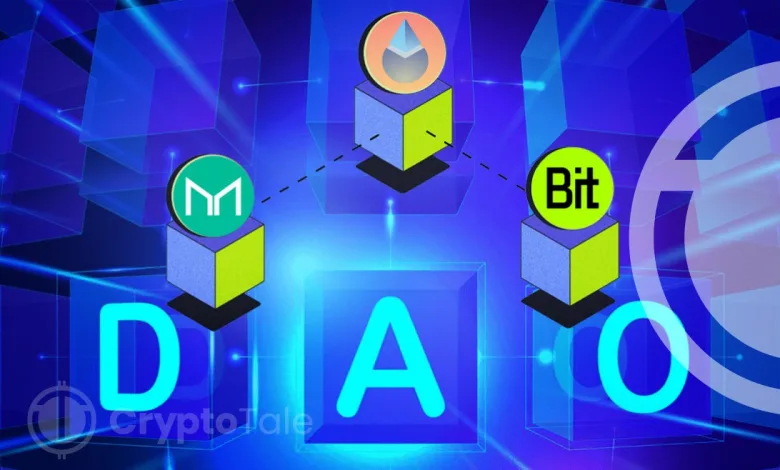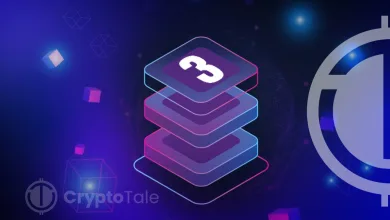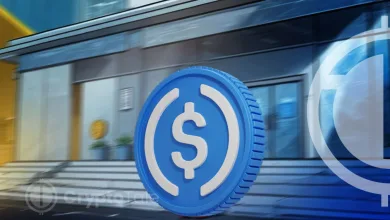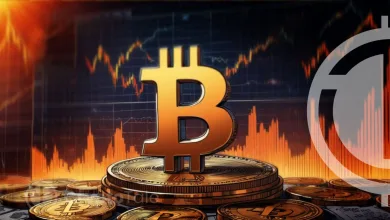Growing Role of DAO in Decentralized Landscape

DAO has emerged as a transformative underdog within the blockchain industry, captivating attention with its distinctive management system. Poised to bring significant changes to the blockchain landscape, the DAO model introduces a revolutionary approach through community-driven consensus. The transformative paradigm is set to wield considerable influence and change the decentralized landscape.
What is a DAO?
DAO (Decentralized Autonomous Organization) is a self-governing entity with a clear structure built on blockchain technology. The structure acts as the organization’s backbone, where rules, processes, and governance mechanisms are encoded in smart contracts. In DAO, there is no centralized authority, and decisions are made through community consensus (voting mechanism). This means all the organization members can participate in decision-making, and each member’s voting power is proportional to their token holdings.
The Evolution of DAO:
In 2014, Vitalik Buterin first proposed the concept of DAO. The subsequent year, Rune Christensen launched MakerDAO, the protocol of the now-DAI. However, the DAO landscape faced a significant setback in 2016 when the newly launched Ethereum DAO project, called “The DAO,” was hacked.
This led to the Ethereum network being hard-forked. Nearly 85% of miners followed the forked version, now called Ethereum, while the remaining followed the original version, renamed Ethereum Classic. Despite the incident causing a lot of criticism, it also sparked interest among developers in the potential of DAO.
Over the years, many new DAOs like the Aragon and MolochDAO were created each serving its unique purpose. Advances in blockchain technology, evolution in design and functionality, enhanced smart contracts, and the growing interest in decentralized governance led to the rise of DAOs.
Reasons for the Growth of DAO:
1. Global Blockchain Adoption:
The recent expansion of DAO can be attributed to the widespread adoption of blockchain technologies. Significant advancements in the blockchain ecosystem have made the essential infrastructure that supports the DAO more accessible and user-friendly. This, in turn, attracted a wider range of participants to engage in decentralized governance.
2. Improvement in smart contracts:
One of the main reasons for the increase in DAO activity was the advancements made in smart contract security. After the incident with “The DAO,” decentralized autonomous organizations(DAOs) have made considerable efforts to implement a more robust and secure framework. This led to renewed confidence in the reliability of smart contracts, thereby paving the way for the renewal of DAOs.
3. Tokenization and Incentive Mechanism:
In a DAO, all members will receive a token representing ownership and voting power. These tokens would serve as incentives for community members to participate, contribute, and align their interests with the DAO. The mutual relationship between the DAO and its community has captured the attention of investors.
4. Decentralized Governance:
Since 2023, the mindset of various individuals and organizations towards decentralized governance has shifted for the better. They began to recognize the advantages of internal decision-making facilitated by the DAO. This has led industries from various fields to explore the possibility of integrating DAO into their structures.
Use Cases of DAO:
Crowdfunding:
DAO can play a significant role in crowdfunding projects. Technopreneurs and startups looking to develop their crypto project can ask for investment through DAO communities. The DAO community will crowdsource the funds from the community members. Investors who invest in the project will be given DAO tokens, which can be used to participate in decision-making processes and propose ideas. Once the fundraising project becomes successful, investors can expect good returns as the token price increases.
Due to its ability to benefit both the issuer and the investor, DAOs are frequently used for crowdfunding purposes. Furthermore, in DAO, investors make the decisions and oversee the project, thereby eliminating concerns related to the Principle-Agent equation.
Collaborative Content Creation:
DAOs possess the power to reshape content creation and distribution. By integrating DAOs into decentralized content platforms, both content creators and consumers can actively participate in decision-making processes and earn fair compensation.
NFT-Powered Investment:
NFT-based investment projects leverage DAOs for governance, providing creators and artists the means to raise funds for their projects while retaining ownership. Investors who hold NFTs associated with these projects can stake their NFTs to cast votes and earn governance tokens representing a fractional share of the project’s assets.
Metaverse Decentralizataion:
DAO governance is poised to significantly change the metaverse, ensuring a transparent and decentralized structure. Members of the DAO community have the power to shape and manage the metaverse through voting on resource allocation, proposing feature changes, and overseeing metaverse environments. For example, take Decentraland, a popular metaverse whose development and management are governed by DAO principles.
Benefits of DAO:
Decentralization:
In DAO, the authority is distributed among community members holding tokens. Decisions are made with the active participation of the community members instead of the CEO or Board of Directors.
Participation:
Despite their limited influence, members will feel motivated to participate in all decision-making and voting processes.
Publicity:
The votes the community members cast will be open to the public. This will force people to vote on what they truly believe while discouraging any acts that might harm the community.
Community:
DAO’s business model encourages people from all over the world with similar visions to collaborate and develop their vision.
Challenges Faced by DAO:
Regulatory Uncertainty:
One of the major challenges facing DAOs is the absence of regulatory certainty. The absence of regulatory clarity poses a problem attracting investors’ attention.
Security Risks:
Security risks pose a significant threat to the functionality of DAOs. Since DAOs rely on smart contracts for execution, any vulnerabilities within these contracts could result in financial loss or more.
Scalability:
Scalability is one of the major issues that the DAO faces. As the number of stakeholders in the DAO increases, the decision-making process becomes burdensome due to the substantial rise in transactions.
Examples of DAO:
MolochDAO:
Moloch DAO differs from most DAOs as it primarily focuses on funding Ethereum-based projects. Furthermore, it employs a rare rage-quitting mechanism and follows the decentralized governance structure. It takes action in the form of proposals and cuts through the red tape to make faster decisions.
BitDAO:
BitDAO is one of the largest decentralized autonomous organizations, and its goal is to build a decentralized tokenized economy. It operates through a decentralized governance mechanism in which $Bit token holders can vote on proposals, suggest strategies, and determine how BitDAO’s resources are used.
DAO Maker:
DAO Maker is an innovative platform that offers growth technologies and Software as a Service (SaaS) solutions to various crypto startups. It uses DAO as the platform’s native currency. Its main product, DAO Pad, allows DAO token holders to participate in the early-stage token sales of some of the promising crypto projects. Some of its successful projects include Orion Protocol (ORN), Seascape Network (CWS), and more.
Conclusion:
DAO represents the potential of decentralized governance to facilitate collaboration, innovation, and community-based decision-making. As DAO grows and people’s understanding of DAO deepens, its influence will spread outside blockchain and to the broader community.





